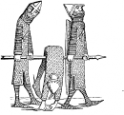Flimsy
And don’t get me started on plastic gutters.
Dear Word Detective: The other day I was struck by the question of the origins of the word “flimsy,” in the sense of a fence unlikely to last, due to poor construction. Several days later, I checked your archives and didn’t see it there and, now that the word is good and stuck in my brain, I hope that you can tell me where “flimsy” came from. — Nancy.
I’ve seen some fences like that. Apparently quite a few people around here have decided to go the pre-fab plastic route, not realizing that “cheap,” clean” and “easy,” after a few winters, translate into “cracked,” “dingy” and “leaning like a drunken sailor.” But I don’t understand the impulse to put a phony windmill next to one’s garage, either, so perhaps I’m simply out of the loop on yard accessories.
 “Flimsy” is a great adjective, both in its literal sense of “frail, insubstantial, delicate” and its figurative use to mean “frivolous, trivial and unconvincing,” as in “A hangnail is a pretty flimsy excuse for missing two weeks of work.” Interestingly, “flimsy” is also a noun, used since the early 19th century as slang for paper money and, since the mid-1800s, for very thin, translucent paper (also called “onionskin”) used to make copies in a typewriter using carbon paper.
“Flimsy” is a great adjective, both in its literal sense of “frail, insubstantial, delicate” and its figurative use to mean “frivolous, trivial and unconvincing,” as in “A hangnail is a pretty flimsy excuse for missing two weeks of work.” Interestingly, “flimsy” is also a noun, used since the early 19th century as slang for paper money and, since the mid-1800s, for very thin, translucent paper (also called “onionskin”) used to make copies in a typewriter using carbon paper.
“Flimsy” in its literal sense first appeared in English in the early 18th century, and appears to have been derived from the word “film” in the sense of “thin covering or membrane” (by definition “insubstantial”). The “i” and “l” of “film” were simply transposed, giving us “flim,” plus the ending “sy” on the model of “tipsy” and similar words.
That may not be the most fascinating word origin you’ve ever heard, but the transposition of those two letters is itself a good story. That sort of switch is called “metathesis,” and the process has played a large role in the evolution of many common English words. “Bird, for instance, comes from the Old English “brid,” our modern “horse” is derived from “hros,” and “wasp” came from a word similar to “waps.” In many cases, the switch is made because speakers of English have trouble with the original combination of letters, and come up with an “easier” pronunciation at odds with the spelling. Sometimes the spelling eventually changes to match the usual pronunciation (as with “bird”), but sometimes it doesn’t, as in “jewelry” (which almost everyone pronounces “joolry”), “realtor” (often spoken as “reel-uh-tor”) and “nuclear” (the widely derided but very common “noo-kyoo-lar”).
Page 1 of 2 | Next page
